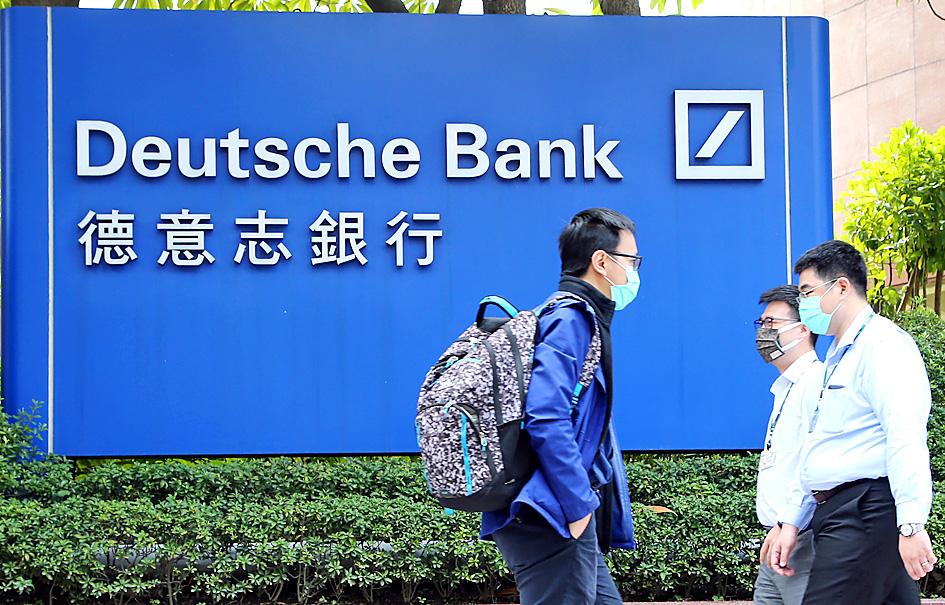The central bank yesterday punished four foreign banks for helping grain merchants speculate in New Taiwan dollar-deliverable forwards in contravention of foreign-exchange regulations.
In a statement issued on its Web site, the central bank said it has revoked the Deutsche Bank Taipei branch’s licenses to trade NT dollar deliverable forwards and NT dollar non deliverable forwards.
The branch has also been banned from foreign-exchange derivatives transactions for two years, the statement said.

Photo: CNA
The central bank has banned the Taipei branches of ING Bank NV and Australia & New Zealand Banking Group Ltd from trading NT dollar deliverable forwards and NT dollar non deliverable forwards for nine months, it said.
Citibank Taiwan Ltd (花旗台灣銀行) has been suspended from NT dollar deliverable forward transactions for two months, it added.
The central bank said it on Friday notified the banks about the punishments, which are to take effect today.
The penalties came after the central bank said on Jan. 21 that eight grain merchants had engaged in currency speculation totaling US$11 billion since July 2019 with the help of branches and subsidiaries of six foreign lenders.
The activities were carried out under the guise of routine currency transactions, which were not in sync with their actual business needs, but affected the stability of the nation’s foreign-exchange market, the central bank said at that time.
“The branches and subsidiaries of six foreign banks in Taiwan have violated the related regulations on NT dollar deliverable forwards, but two of them stopped the questionable practices before the central bank’s special investigation,” yesterday’s statement said.
The central bank said it settled the case with the two unidentified lenders in November last year, as they had voluntarily stopped the questionable transactions and settled the unexpired positions soon after learning about the abnormality in the merchants’ financial reports and business situation.
Amid massive capital inflows, the NT dollar appreciated 5.6 percent against the US dollar last year. So far this year, the local currency has risen 0.41 percent against the greenback, but it has repeatedly challenged a 23-year high of NT$28 during intraday trading, the central bank’s data showed.
The central bank had opened the probe last year as part of its efforts to crack down on currency speculation amid rapid appreciation of the NT dollar.
It also asked custodian banks to exercise restraint in trades through moral persuasion and in a Facebook post urged the parties to maintain stable exchange rates.
The central bank’s latest effort to curb foreign-exchange speculation was announced on Wednesday, when it said it plans to revise foreign-exchange rules and cap foreign-currency settlements at US$50 million for companies and US$500,000 for individuals per year.

South Korea’s equity benchmark yesterday crossed a new milestone just a month after surpassing the once-unthinkable 5,000 mark as surging global memory demand powers the country’s biggest chipmakers. The KOSPI advanced as much as 2.6 percent to a record 6,123, with Samsung Electronics Co and SK Hynix Inc each gaining more than 2 percent. With the benchmark now up 45 percent this year, South Korea’s stock market capitalization has also moved past France’s, following last month’s overtaking of Germany’s. Long overlooked by foreign funds, despite being undervalued, South Korean stocks have now emerged as clear winners in the global market. The so-called “artificial intelligence

‘SEISMIC SHIFT’: The researcher forecast there would be about 1.1 billion mobile shipments this year, down from 1.26 billion the prior year and erasing years of gains The global smartphone market is expected to contract 12.9 percent this year due to the unprecedented memorychip shortage, marking “a crisis like no other,” researcher International Data Corp (IDC) said. The new forecast, a dramatic revision down from earlier estimates, gives the latest accounting of the ongoing memory crunch that is affecting every corner of the electronics industry. The demand for advanced memory to power artificial intelligence (AI) tasks has drained global supply until well into next year and jeopardizes the business model of many smartphone makers. IDC forecast about 1.1 billion mobile shipments this year, down from 1.26 billion the prior

People stand in a Pokemon store in Tokyo on Thursday. One of the world highest-grossing franchises is celebrated its 30th anniversary yesterday.

Chinese artificial intelligence (AI) start-up DeepSeek’s (深度求索) latest AI model, set to be released as soon as next week, was trained on Nvidia Corp’s most advanced AI chip, the Blackwell, a senior official of US President Donald Trump’s administration said on Monday, in what could represent a violation of US export controls. The US believes DeepSeek will remove the technical indicators that might reveal its use of American AI chips, the official said, adding that the Blackwells are likely clustered at its data center in Inner Mongolia, an autonomous region of China. The person declined to say how the US government received